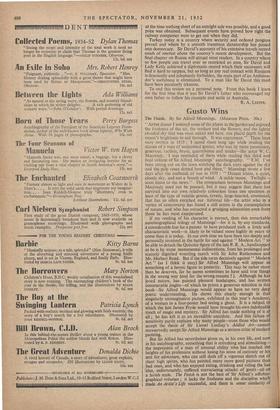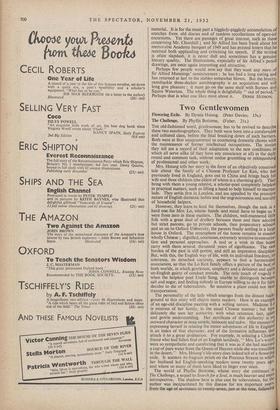Gusto Wins
The Finish. By Sir Alfred Munnings. (Museum Press. 30s.) "AFTER dinner I watered some of the plants in the/garden and enjoyed the freshness of the air, the verdure and the flowers, and the lightly clouded sky that was soon naked and bare, one placid depth for the moon's brightness to sail through. It was enjoyment.'"' These lines were written in 1835 ; I noted them long ago while reading the diaries of a man of undoubted genius, who was by turns passionate, generous, tactless, brave, quarrelsome and tender—the actor W. C. Macready. I was reminded of them while reading this third and final volume of Sir Alfred Munnings' autobiography. " 8.30. I've been sitting out on the lawn watching the dark trees against the sky and the pale roses dotted here and there," Munnings wrote a few days after the outbreak of war in 1939 : " Distant trains, a quiet, cloudy sky, and not a breath of wind. A sickle moon. Twilight— soon listen to the news." The comparison between Munnings and Macready need not be pressed, but it may suggest that there has survived into our own relatively colourless times one specimen at least of the type of volatile genius, 'erratic, large-hearted, emotional, that has so often enriched our national life—the artist who in a vortex of controversy has found a still centre in the contemplation of nature, and who has extracted a grudging admiration even from those he has most exasperated.
If my reading of his character is correct, then this remarkable autobiographical trilogy of Munnings'—for it is, by any standards, a considerable feat for a painter to have produced such a lively and characteristic work—is likely to be valued more highly in years to come than it is today. In our own time we have been too deeply and personally involved in the battle for and against " Modern Art " to be able to detach the Quixotic figure of the late P. R. A., handicapped as he is by some monumental indiscretions, from his prolonged and scarcely dignified wrestling match with Sir John Rothenstein and Mr, Herbert Read. But if the tide turns decisively against " Modern Art " (as I think it may) Sir Alfred Munnings will appear as something of a heroic figure to posterity. This may be rather more than he deserves, for he seems sometimes to have said true things in the wrong way (and for the wrong reasons ? ). Although he has loved nature, has painted pleasant landscapes, and has written innumerable jingles—of which he prints a generous selection in this book—Sir Alfred Munnings would appear to have no very deep poetic understanding. He shows this clearly enough in that singularly unimaginative picture, exhibited in this year's Academy, of a woman in a four-poster bed seeing a ghost. It is a subject to which the late James Pryde would have brought his own indefinable touch of magic and mystery. Sir Alfred has made nothing of it at all ; he has left it as an incredible anecdote. And this failure of sensitivity partly explains why many people—even those who would accept the thesis of Sir Lionel Lindsay's Addled Art—cannot unreservedly aecept Sir Alfred Munnings as a serious critic of modern painting. But Sir Alfred has nevertheless given us, in his own life, and now in his autobiography, something that is refreshing and stimulating-- the impression of a man of unusual ability who has reached the heights of his profession without losing his sense of curiosity or his zest for adventure, who can still dash off a vigorous sketch out of sheer high spirits, who has painted many more good pictures than bad ones, and who has enjoyed eating, drinking and riding (he has 'also, unfortunately, suffered excruciating attacks of gout)—all on a lavish scale. The Finish is not the best of Sir Alfred's autobio- graphical volumes ; it lacks the freshness and the discipline which made An Artist's Life successful, and there is some similarity of
material. It is for the most part a higgledy-piggledy accumulation of snatches from old diaries and of random recollections of open-air excursions. Yet there are.passages of great interest, such as those concerning Mr. Churchill ; and Sir Alfred has been frank about his memorable Academy banquet of 1949 and has printed letters that he received both applauding and criticising his speech. If the writing is often slapdash, it is never dull and sometimes has a genuine literary quality. The illustrations, expecially of Sir Alfred's pencil drawings, are once again interesting and attractive.
Perhaps few people would now say that they want any more of Sir Alfred Munnings' reminiscences ; he has had a long outing and has returned at last to the stables somewhat blown. But the breezy, ramshackle three-decker autobiography is an acquisition and will long give pleasure ; it must go on the same shelf with Surtees and Squire Waterton. The whole thing is delightfully " out of period."
Perhaps that is what one likes most about it. DEREK HUDSON.











































































 Previous page
Previous page